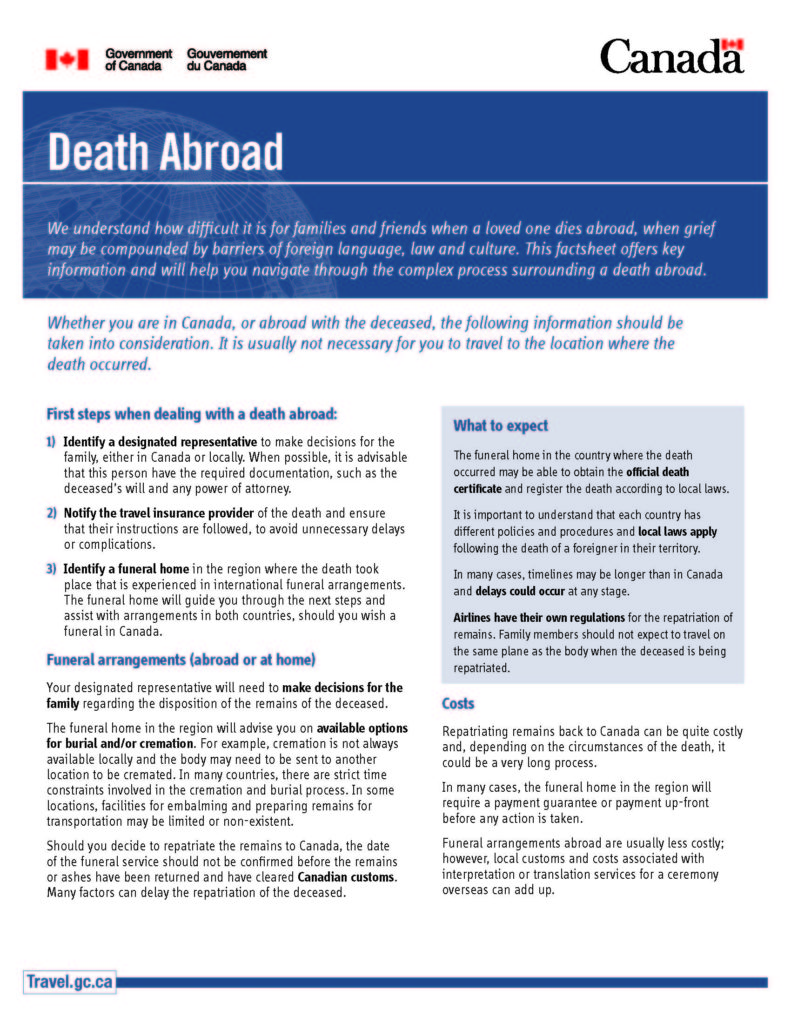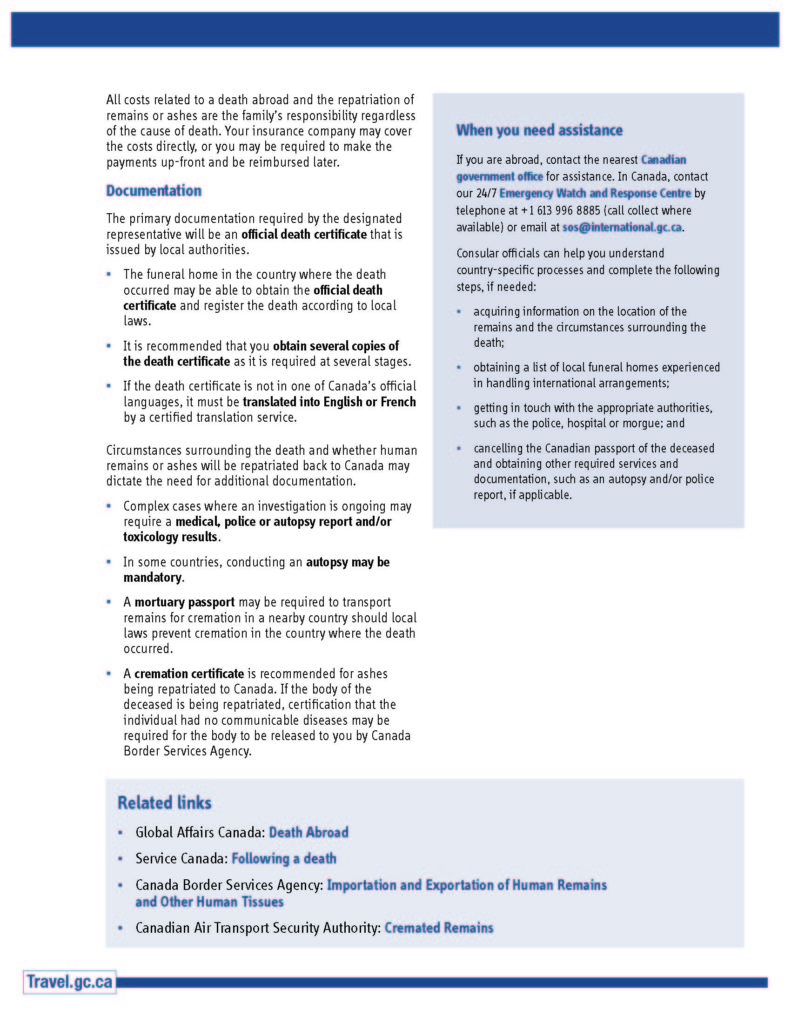Death Abroad
We understand how difficult it is for families and friends when a loved one dies abroad. It is hard to grieve while you have to find out what to do in a place with a different language, laws and culture.
Whether you are in Canada, or abroad with the deceased, here is what you should know.
What to do first:
- Choose someone to make decisions for the family, either in Canada or where the death took place. If possible, this person should have the required documentation, such as the deceased’s will and any powers of attorney.
- Notify the deceased person’s travel insurance provider and make sure that you follow their instructions to avoid unnecessary delays or complications.
- Find a funeral home in the region where the death took place that is experienced in international funeral arrangements. The funeral home will guide you through the next steps and help you with arrangements in both countries if you decide to have the funeral in Canada.
- Cancel the deceased’s benefits including Old Age Security, Canada Pension Plan, Social Insurance Number, Employment Insurance and tax-related payments, and personal identification. The passport of a deceased person should be returned to Canada’s Passport Program .
- Understand that each country has different policies and procedures and local laws apply when a foreigner dies there. Timelines may often be longer than in Canada and delays can occur at any time.
Documentation
Your family’s representative must obtain an official death certificate issued by the country where the death occurred.
- The funeral home you choose in the country where the death occurred may be able to obtain the official death certificate and register the death according to local laws.
- Make sure you ask for several copies of the death certificate as it is required at a number of stages.
- If it is not in one of Canada’s official languages, the death certificate must be translated into English or French by a certified translation service.
You may need more documents depending on the circumstances surrounding the death and whether the human remains or ashes will be sent back to Canada.
- If there is an investigation into the death, you may require a medical, police or autopsy report and/or toxicology results.
- In some countries an autopsy may be required.
- If local laws prevent cremation in the country where the death occurred you may need a mortuary passport to transport the remains to a nearby country for cremation.
- If the ashes are being repatriated to Canada, you should have a cremation certificate. If the body of the deceased is being repatriated, the Canada Border Services Agency may require certification that the individual had no communicable diseases before they will release the body to you.
Funeral arrangements (abroad or at home)
Your family’s representative must decide quickly whether the remains of the deceased should be returned to Canada, or buried or cremated in the country where the death occurred. Funeral customs and costs may be very different there. Consular officers at the neared Canadian government office abroad can give you advice and guidance on the local procedures.
The local funeral home will tell you about available options for burial or cremation. Some countries do not allow cremation and many have strict time limits on the cremation and burial process. Some places may have few or no facilities for embalming and preparing remains for transportation.
If you intend to repatriate the remains, the Canada Border Services Agency’s Importation and exportation of human remains and other human tissues explains the rules and processes for returning remains to Canada.
Repatriating remains
Returning the remains of a loved one to Canada requires the help of qualified funeral homes in Canada and in the country where the death occurred.
If you decide to repatriate the remains of the deceased person to Canada, the date of the funeral service should not be confirmed before the remains or ashes have been returned and have cleared Canadian customs, because the repatriation can be delayed for many reasons. Airlines have their own regulations for the repatriation of remains. Family members should not expect to travel on the same plane as the body when it is being repatriated.
The time required to repatriate remains can vary greatly and depends on a number of factors, including the procedures in the country where the death occurred and the cause of death.
Bringing cremated remains into Canada
If you choose to carry cremated remains on board an aircraft, you must notify the airline in advance to ensure you have the proper documentation, which may include copies of the death and cremation certificates. Not all airlines will transport cremated remains and some may only transport them as cargo. The funeral director may be able to provide you with a temporary container for transportation purposes. Containers made of cardboard, wood or plastic are more likely to clear the x-ray machine at airport security and be permitted past the checkpoints. If the container is made of a dense material such as metal, stone or ceramic, screening officers may not be able to see its contents clearly and may reject it or request it be opened. In this case, you will have to make alternate arrangements to ship it.
The Canada Border Services Agency’s publication on Importation and exportation of human remains and other human tissues explains the rules and processes for bringing ashes to Canada.
If you are planning to carry cremated remains on board an aircraft, please consult the Canadian Air Transport Security Authority’s Cremated Remains page, or call 1 800 O-Canada from anywhere in the world.
Costs
It can be very expensive to repatriate remains back to Canada and, depending on the circumstances of the death it could take a long time. In many cases, the funeral home in the region will require a payment guarantee or payment upfront before it will start the process.
Funeral arrangements abroad usually cost less than in Canada, but local customs and the cost of interpretation or translation services for a ceremony overseas can add up. All costs related to a death abroad and the repatriation of remains or ashes are the family’s responsibility regardless of the cause of death. Your insurance company may cover the costs directly, or you may have to make the payments and be reimbursed later.
If you need help
You may, but do not have to, report the death abroad of a Canadian citizen to the nearest Canadian government office abroad or, from Canada, to The Canadian Emergency Watch and Response Centre. You do not have to travel to the country where the death occurred, and consular officials can help you understand the processes there and help you to complete the following steps, if needed:
- Give you advice on how to get in touch with the relevant authorities to obtain the appropriate documentation, including death certificates, autopsy and police reports and documentation for insurance companies, if necessary.
- If family members or friends are not able to do so, contact the appropriate authorities (police, hospital and morgue) to find the location of the remains and the circumstances surrounding the death.
- Help to identify the remains of a Canadian citizen if local authorities, family members or friends are not able to do so.
- Provide a list of laboratory facilities offering forensic identification services (DNA, dental records, fingerprints).
- Give you information on local internment options, costs and a list of local funeral service providers.
- Give you advice on how to bring embalmed or cremated remains to Canada.
- Authenticate the local death certificate for insurance or repatriation purposes after it has been authenticated by the local Ministry of Foreign Affairs.
Canadian government offices abroad will not:
- Pay for the burial, cremation or repatriation of the remains of a deceased Canadian citizen.
- Intervene in private legal matters.
- Translate official documents.
- Provide legal advice.
- Investigate or intervene in a local investigation.


source: travel.gc.ca
